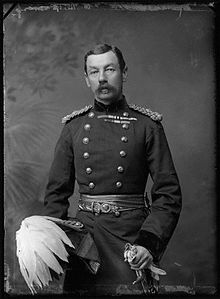Drury Curzon Drury-Lowe
Sir Drury Curzon Drury-Lowe GCB (born January 3, 1830 in Aston Lodge near Aston-on-Trent , † April 6, 1908 ) was a British Lieutenant General . He fought in various British colonial wars.
Life
Drury Curzon Drury-Lowe was born under the name Drury Curzon-Holden, the son of landowner William Drury Holden . In 1849, William Drury Holden changed the family name to Drury-Lowe after his grandmother. After graduating from Corpus Christi College , Oxford , Drury Curzon Drury-Lowe joined the 17th Lancer Regiment of the British Army in 1854 as a cornet . With this he took part in the Crimean War as a lieutenant in 1855 . There he fought in the Battle of Chernaya and the Siege of Sevastopol . From 1858 to 1859 Drury-Lowe served at the time of the Sepoy Uprising in British India and was mentioned in the war report .
After the disaster at the Battle of Isandhlwana , reinforcements were sent to South Africa from across the Empire, including the 17th Lancer Regiment. Since the regimental commander had shot himself in the foot, Drury-Lowe was given command of the regiment. He led this in the Zulu War and thus had a considerable share in the victory in the Battle of Ulundi . For this he was accepted as a Companion in the Order of the Bath in the same year . In 1881 he took over command of the cavalry brigade in the Transvaal .
Drury-Lowe took part in the Anglo-Egyptian War in 1882 to suppress the Urabi movement . He led the cavalry division consisting of the heavy and the Bengali brigade. With this he took Mahranas and fought at Kassassin and in the battle of Tel-el-Kebir . The day after the battle, Drury-Lowe was the first to reach Cairo . His arrival at 3 a.m. surprised the garrison, so that he was able to occupy the city without a fight and accept Urabi Pasha's surrender . For his achievements in the campaign he was knighted on November 18, 1882 as Knight Commander of the Order of the Bath and received thanks from the House of Commons . Returning to Great Britain, Drury-Lowe took command of the cavalry brigade in the Aldershot garrison and was Inspector General of the Cavalry from 1885 to 1891. In 1890 he was promoted to lieutenant general. Drury Curzon Drury-Lowe was the 17th Lancer regiment chief in 1892 , of which he was in command at Ulundi. In 1895 he was raised to the Knight Grand Cross of the Order of the Bath on the occasion of his retirement .
His grave is in Denby .
Promotions
- 1854 cornet
- November 1854 First Lieutenant
- November 1856 captain
- 1862 Major through the purchase of an officer's license
- 1866 Lieutenant Colonel
- 1881 Major General
- 1890 Lieutenant General
Web links
- Biography of Sir Drury Curzon Drury-Lowe (1830-1908) at the University of Nottingham
| personal data | |
|---|---|
| SURNAME | Drury-Lowe, Drury Curzon |
| ALTERNATIVE NAMES | Curzon-Holden, Drury |
| BRIEF DESCRIPTION | British Lieutenant General |
| DATE OF BIRTH | January 3, 1830 |
| PLACE OF BIRTH | Aston-on-Trent |
| DATE OF DEATH | April 6, 1908 |

